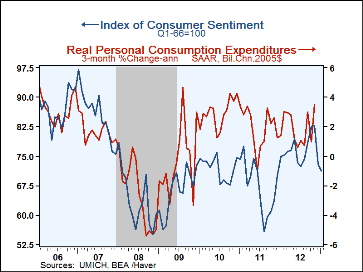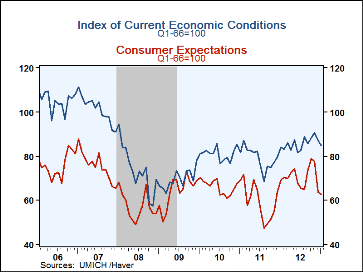 Global| Jan 18 2013
Global| Jan 18 2013U.S. Consumer Sentiment Becomes More Depressed
by:Tom Moeller
|in:Economy in Brief
Summary
The University of Michigan's Index of Consumer Sentiment for mid-January deteriorated to 71.3 (-4.9% y/y) from an already depressed and unrevised 72.9 in December. The latest figure fell short of Consensus expectations for improvement [...]
The University of Michigan's Index of Consumer Sentiment for mid-January deteriorated to 71.3 (-4.9% y/y) from an already depressed and unrevised 72.9 in December. The latest figure fell short of Consensus expectations for improvement to 74.0. During the last ten years there has been a 61% correlation between the level of sentiment and the three-month change in real personal consumption expenditures. Both of the index's major components fell last month. The index measuring sentiment regarding current economic conditions fell to 84.8 (+0.7% y/y) and was down just moderately for the last two months. The consumer expectations index fell to 62.7 (-9.3% y/y), down for the third straight month.
The Reuters/University of Michigan survey data are not seasonally adjusted. The readings are based on telephone interviews with over 300 households. Data can be found in Haver's USECON database. The expectations figure is from Action Economics and can be found in Haver's AS1REPNA database.
Persistent Uncertainty for Economic Policymakers from the Federal Reserve Bank of Cleveland is available here.
| University of Michigan (Q1'66 = 100) |
Mid-Jan | Dec | Nov | Jan '12 | 2012 | 2011 | 2010 |
|---|---|---|---|---|---|---|---|
| Consumer Sentiment | 71.3 | 72.9 | 82.7 | 75.0 | 76.5 | 67.3 | 71.8 |
| Current Economic Conditions | 84.8 | 87.0 | 90.6 | 84.2 | 85.6 | 79.1 | 80.9 |
| Consumer Expectations | 62.7 | 63.8 | 77.7 | 69.1 | 70.7 | 59.8 | 66.0 |
Tom Moeller
AuthorMore in Author Profile »Prior to joining Haver Analytics in 2000, Mr. Moeller worked as the Economist at Chancellor Capital Management from 1985 to 1999. There, he developed comprehensive economic forecasts and interpreted economic data for equity and fixed income portfolio managers. Also at Chancellor, Mr. Moeller worked as an equity analyst and was responsible for researching and rating companies in the economically sensitive automobile and housing industries for investment in Chancellor’s equity portfolio. Prior to joining Chancellor, Mr. Moeller was an Economist at Citibank from 1979 to 1984. He also analyzed pricing behavior in the metals industry for the Council on Wage and Price Stability in Washington, D.C. In 1999, Mr. Moeller received the award for most accurate forecast from the Forecasters' Club of New York. From 1990 to 1992 he was President of the New York Association for Business Economists. Mr. Moeller earned an M.B.A. in Finance from Fordham University, where he graduated in 1987. He holds a Bachelor of Arts in Economics from George Washington University.








